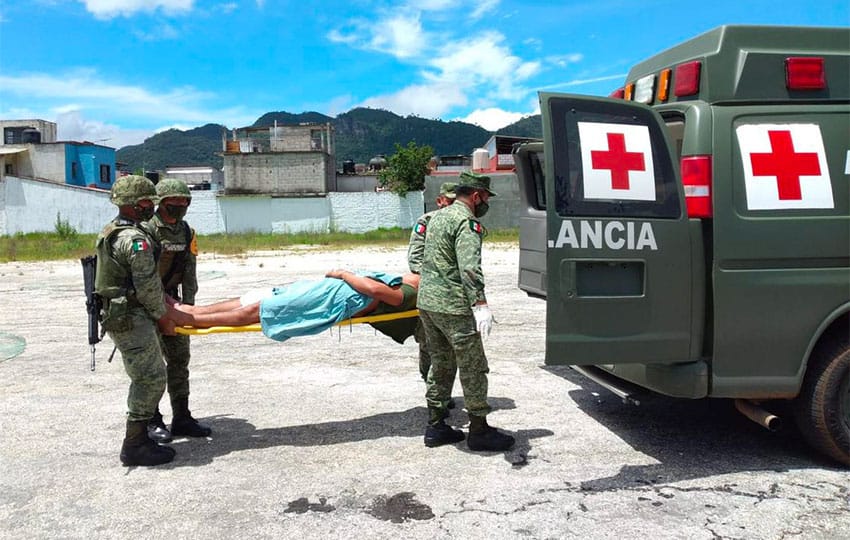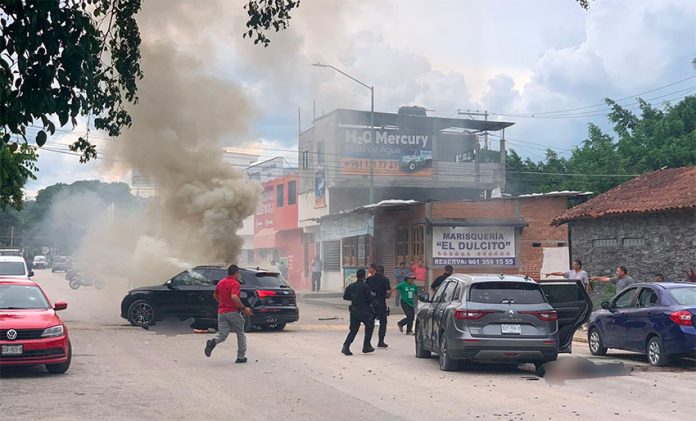The Jalisco New Generation Cartel (CJNG) is making its presence felt in Chiapas, a state coveted by drug, arms and human traffickers due to its long border with Guatemala, but one that has largely avoided the kind of cartel violence for which some other states are notorious.
Presumed CJNG gunmen killed five suspected members of the Sinaloa Cartel in the state capital Tuxtla Gutiérrez last Wednesday.
The Jalisco sicarios ambushed the Sinaloa operatives in La Gloria, an affluent neighborhood of Tuxtla, a city of approximately 600,000 people where gun violence is rare.
One of the five slain men was Ramón Rivera, a Sinaloa Cartel plaza chief in Chiapas and son of Gilberto Rivera, a trafficker known as “the lord of the southern border” who was arrested in Guatemala in 2016 and extradited to the United States a year later.
Carmen Villa, head of the Citizens Security Observatory in Chiapas, said the armed attack was an abnormal event for Tuxtla and the entire state.

She acknowledged there have been armed confrontations in Chiapas but asserted that disputes in the state are generally not between drug cartels. The cartel violence that plagues many parts of Mexico is a “very distant reality” for Chiapas residents, Villa said.
“… My reaction [to last Wednesday’s attack] and perhaps that of bystanders was very naive; many were filming the shootout, many people didn’t believe what was happening. … I don’t know what is worse – not having the preparation to react or to get used to [cartel violence] and know what it’s about. … It was definitely something extraordinary and sadly I believe it won’t be a one-off experience,” she said.
Meanwhile, a criminal group allegedly affiliated with the CJNG seized control of a town in the Alto de Chiapas (highlands) region last Wednesday and subsequently clashed with police and military personnel.
Los Ciriles took control of Pantelhó and it wasn’t until Thursday that state and federal security forces arrived in the town, located 120 kilometers northeast of Tuxtla. They were ambushed on arrival, the newspaper Reforma reported, and nine police and soldiers were wounded.
Los Ciriles are also believed to be responsible for the murder last Monday of Simón Pedro Pérez López, a human rights activist who was gunned down in front of his son.
Pedro Faro, director of the Fray Bartolomé de las Casas Human Rights Center, claimed that Los Ciriles also have links to the Democratic Revolution Party, which is in office in Pantelhó.
He told Reforma that the criminal group has instilled fear in residents for years and committed 13 murders since March last year.
“… It has threatened, harassed and murdered people in … [their] homes. They’ve gone looking for them because they haven’t wanted to collaborate with the criminal group,” Faro said. At least 65 people have fled Pantelhó out of fear, he added.
According to federal authorities, the CJNG, the Sinaloa Cartel and the Gulf Cartel are the three main cartels operating in Chiapas, which has a border of more than 650 kilometers with Guatemala. The Sinaloa Cartel has long controlled much of the border area and is the dominant criminal organization but the CJNG appears intent on muscling in on its territory to expand its influence, as it has already done in some other states such as Guanajuato and Michoacán.
The tussle between cartels has the potential to significantly increase homicide numbers, as armed confrontations such as that seen in Tuxtla last week typically result in multiple deaths. Villa, the citizens observatory chief, noted that homicides in Chiapas increased 30% in May compared to the same month last year and femicides, home burglaries and drug trafficking offenses increased by significantly higher percentages.
“The conversation between those of us who analyze security, which is a small circle because Chiapas has other more ‘urgent’ problems’ is that this [new criminal] reality has already reached us,” she said.
Homicides in Mexico reached a record high of more than 34,000 in 2019 – President López Obrador’s first full year in office – before falling just 0.4% last year. Murders did, however, decline 2.9% in the first five months of 2021 compared to the same period last year, an achievement that has been repeatedly highlighted by federal officials.
There were 14,243 homicides between January and May, of which only some 200 occurred in Chiapas. The southern state is far from the most violent in Mexico but recent events indicate that the security situation could be about to worsen.
